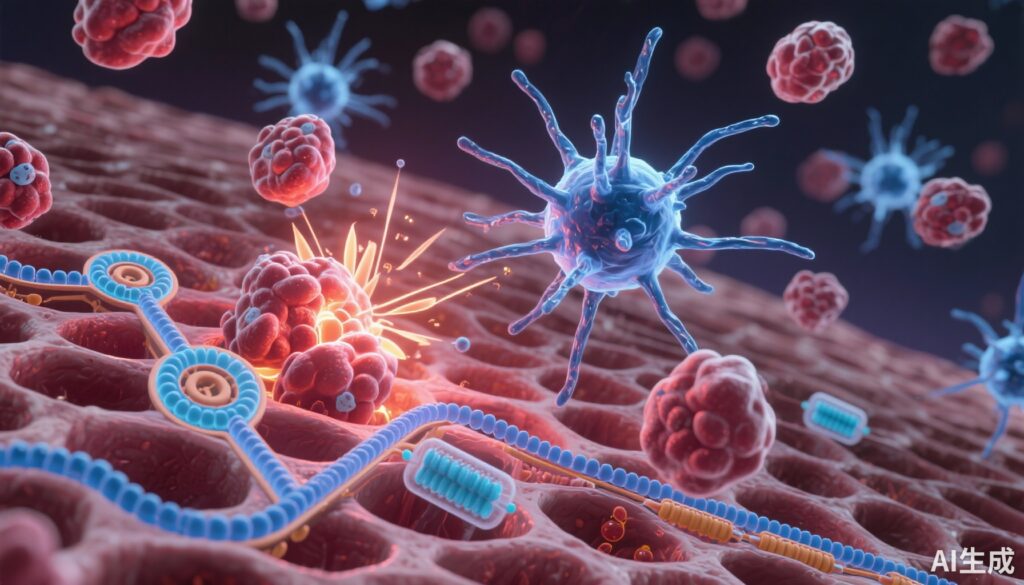Highlight
This article explores how reprogramming glutamine metabolism enhances the function and efficacy of BCMA-targeted CAR T-cell therapies in multiple myeloma (MM). Key findings include: 1) Glutamine deprivation hampers CAR T-cell proliferation and functionality; 2) Overexpression of the glutamine transporter Asct2 in CAR T-cells restores proliferation, IFN-γ production, and cytotoxicity in glutamine-poor environments; 3) Asct2 expression reprograms CAR T-cell metabolic fitness by upregulating mTORC1 signaling and improving mitochondrial and glycolytic functions; 4) Enhanced metabolic fitness translates into improved therapeutic efficacy and survival in murine MM models; 5) In patients, low MM cell Asct2 expression correlates with poorer outcomes from BCMA-CAR T and immunotherapy.
Study Background
Multiple myeloma, a hematologic malignancy characterized by clonal proliferation of plasma cells in the bone marrow, remains incurable despite advancements in therapy. Chimeric antigen receptor (CAR) T-cell therapy targeting B-cell maturation antigen (BCMA) has shown promising response rates but is limited by tumor-induced immunosuppressive mechanisms and T-cell dysfunction. Tumor cells often have high glutamine dependence, which reduces the local availability of glutamine, a critical nutrient for T-cell activation and function. This metabolic competition fosters an immunosuppressive microenvironment, potentially limiting CAR T-cell efficacy. Understanding and overcoming metabolic constraints such as glutamine deprivation could improve CAR T-cell therapeutic benefit in MM and possibly other glutamine-dependent cancers.
Study Design
The study utilized murine models of MM to investigate the impact of glutamine availability on BCMA-specific CAR T-cell functionality. CAR T cells were genetically engineered to overexpress Asct2 (SLC1A5), a key glutamine transporter, to augment glutamine uptake capabilities. Comparisons were drawn between conventional BCMA-CAR T-cells and Asct2-overexpressing CAR T-cells under varying glutamine concentrations. Functional assays assessed proliferation, cytokine production (notably interferon-γ), and cytotoxicity against MM cells. Metabolic profiling evaluated mTORC1 pathway activity, expression changes in solute carrier transporters (SLC), oxygen consumption rate, and glycolysis. Therapeutic efficacy was tested in syngeneic and genetically engineered MM mouse models, with survival as a primary endpoint. Clinical relevance was explored by correlating Asct2 expression levels in patient MM cells with outcomes to combined immunotherapy and BCMA-CAR T treatment.
Key Findings
The study revealed that glutamine deprivation significantly impaired antigen-specific T-cell proliferation and IFN-γ production, emphasizing glutamine’s role as a metabolic checkpoint for CAR T-cell activity. Murine BCMA-CAR T-cells were notably sensitive to glutamine scarcity, showing reduced anti-MM efficacy.
Engineering CAR T cells to overexpress Asct2 augmented glutamine uptake, restoring their proliferative capacity and enhancing cytokine secretion despite low glutamine levels. Asct2-expressing CAR T cells exhibited superior cytotoxicity against MM cells compared to conventional CAR T cells under glutamine-limited conditions.
Mechanistically, Asct2 overexpression promoted a metabolic reprogramming characterized by:
- Upregulation of the mTORC1 gene signature, a pivotal regulator of cell growth and metabolism.
- Altered Solute Carrier (SLC) transporter repertoire facilitating improved nutrient uptake.
- Increased basal oxygen consumption rate indicating enhanced mitochondrial respiration.
- Elevated glycolytic function boosting energy production and biosynthesis.
This metabolic fitness enhanced CAR T-cell persistence in vivo, contributing to more sustained anti-tumor activity. In syngeneic and genetically engineered murine MM models, Asct2-enhanced BCMA-CAR T therapy significantly prolonged overall survival.
Correlative clinical analyses demonstrated that patients with MM cells exhibiting low Asct2 expression had worse outcomes following combined immunotherapy and BCMA-CAR T-cell treatment, supporting the translational relevance of targeting glutamine metabolism.
Expert Commentary
This study elegantly links tumor-driven glutamine deprivation with impaired CAR T-cell efficacy in MM, a critical insight for the field of cancer immunometabolism. Reprogramming glutamine metabolism by Asct2 overexpression represents a feasible strategy to metabolically empower CAR T cells. By improving nutrient uptake and metabolic fitness, CAR T cells may overcome the hostile tumor microenvironment and enhance therapeutic durability.
While promising, these findings warrant further exploration in clinical trials to assess the safety, persistence, and efficacy of metabolically reprogrammed CAR T cells in patients. Potential risks related to altered CAR T-cell metabolism, such as exhaustion or off-target effects, should be monitored. Additionally, the interplay between glutamine metabolism and other immunosuppressive pathways in MM microenvironment requires investigation.
Conclusion
Reprogramming glutamine metabolism via Asct2 transporter overexpression enhances BCMA-CAR T-cell fitness and anti-myeloma efficacy under nutrient-restricted conditions. This study offers a compelling metabolic intervention to overcome tumor-induced immunosuppression and improve outcomes in MM. The approach may also have broader applicability in other glutamine-dependent cancers, representing a meaningful advance in precision immunotherapy that integrates metabolic modulation with cellular engineering.
Further clinical studies are needed to validate these preclinical results and optimize this strategy for patient benefit.
Funding and ClinicalTrials.gov
Funding details were not specified in the original publication. The clinical translation of this approach will require validation in future prospective clinical trials.
References
Navarro F, Lozano T, Fuentes-García A, Sánchez-Moreno I, Larrayoz M, Justicia P, Perucha B, Martinez-Tabar M, Martinez-Turrillas R, Casares N, Martín-Otal C, Gorraiz M, Meermeier EW, Chesi M, Lake D, Bergsagel PL, Santamaría E, Calleja-Cervantes ME, San Martín-Úriz P, Jordana-Urriza L, Agirre X, Hervas-Stubbs S, Rodriguez-Madoz JR, Martínez-Climent JA, Prosper F, Lasarte JJ. Reprogramming glutamine metabolism enhances BCMA-CART cell fitness and therapeutic efficacy in multiple myeloma. Blood. 2025 Sep 19:blood.2024027496. doi: 10.1182/blood.2024027496. Epub ahead of print. PMID: 40971494.



